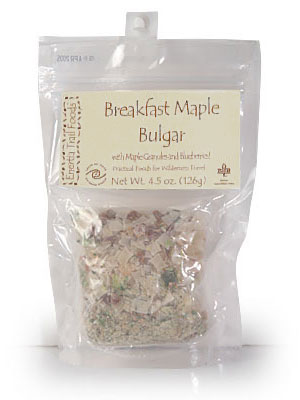|
Whether you are backpacking or kayak camping, you seem to start thinking about food almost continuously. It's probably because you are burning up so many calories due to paddling or hiking that gets you day dreaming about "What's for lunch or dinner?" When you finally start cooking, it better be at least as good as what you've been thinking about all day long.
 There is a big difference between paddling and backpacking on the types and amount of food you can carry with you. Water, which weighs approximately 8 pounds per gallon is a luxury when hiking (due to the weight) while a kayak can carry much more water.
There is a big difference between paddling and backpacking on the types and amount of food you can carry with you. Water, which weighs approximately 8 pounds per gallon is a luxury when hiking (due to the weight) while a kayak can carry much more water.
Not Being Disappointed:
You definitely don't want to be disappointed when it is time to start eating and good tasting food is high on the list of priorities. Don't experiment during the trip by trying new types of foods that you haven't experienced before.
Having Enough:
Based on the type and the amount of exercise that day, you obviously should be content and filled from the amount of food consumed for that meal. You definitely don't want to start traveling after lunch feeling that you were undernourished. Be aware of the amount of calories that you might have burned off and listen to your body talking to you. Always pack a little more food than you think you might need (as long as you can carry the extra weight).
Snack During The Day:
Share an energy bar or trail mix with your companion during the day and don't wait until the last minute to open it up. Nuts, raisons, dried fruits, etc. are a great source of nutritional energy. Candy is not a substitute for good food. Anticipation is the key to not becoming hungry.
Don't Worry About The Amount Of Food You Eat:
There is an excellent chance that you will weigh less than when you started, so don't worry about all the extra food you are eating during the time versus how much you usually eat. You have to eat more and you metabolism will burn it off during the trip or after the trip.
Realize That Experience Will Be Your Guide:
You will NOT get it right the first time... the right amount of food, the right food to bring, the right combination of meals, the right convenience foods, etc. As you pack for more trips, your experience will help you become a better planner.
Keep The Meals Simple:
Unless you really have a love for cooking (I do), at the end of the day, you might be too tired to take the time to prepare the meal. Consider taking pre-packed meals (freeze-dried) even though they will be more expensive. You will be very excited to only have to boil water in the preparation of your meal.
Dehydrate Your Foods:
I dehydrate my foods using a dehydrator - fruits, vegetables, meals, sauces, etc. They are quite tasty. I prepare them in advance (when the prices are low) and freeze them. When I need certain foods, I just go to my freezer and remove what I need.
Lightweight Dry Foods:
Instant Rice, thin pasta, high energy drink mixes, cup-a-soups, chilli, instant hot cereals, granola, nuts, raisins, etc. are good meals to bring because of the space vs. weight ratio. Don't drink too much coffee and tea as they are both diuretics.
Bring Plenty Of Spices:
Spices are the ultimate of importance as they can doctor up any meal that is just plain bland. I bring garlic, pepper, oregano, chili, onion, curry, fish mixture spice and hot pepper. Whatever spices you decide to bring will be just fine.
Fresh Foods:
If you are paddling, you can bring more fresh foods than if you are hiking. The hatches will keep the food cool based on the climate and conditions that you are paddling in.
Pack Each Day Together:
Pack a breakfast, lunch and dinner together so it will be easy to pull out a specific day. I know that there will be reasons to pack all breakfasts together, all lunches together and all dinners together. But, if you are like me, and all food tastes fine (and you really bring meals that you enjoy), packing a specific day together makes a lot of sense. It is just less work each time you have to prepare a meal.
I hope some of these ideas will help you plan your meals while you're on the trail or on the water.
| 
